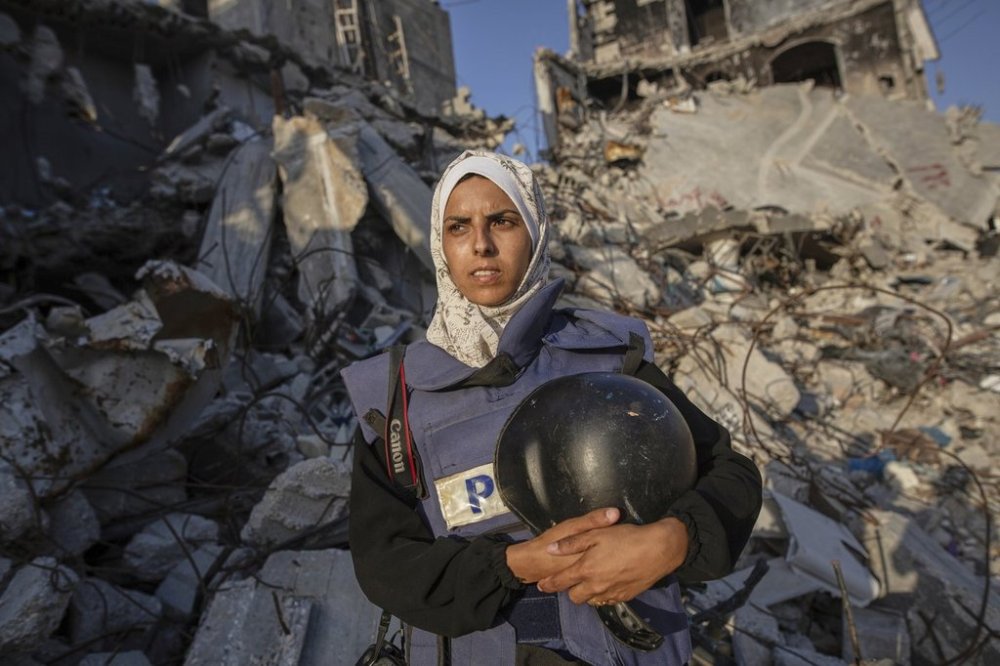The 189 Palestinian journalists killed in the war in Gaza endured hunger and grief
Advertisement
Read this article for free:
or
Already have an account? Log in here »
To continue reading, please subscribe:
Monthly Digital Subscription
$1 per week for 24 weeks*
- Enjoy unlimited reading on winnipegfreepress.com
- Read the E-Edition, our digital replica newspaper
- Access News Break, our award-winning app
- Play interactive puzzles
*Billed as $4.00 plus GST every four weeks. After 24 weeks, price increases to the regular rate of $19.00 plus GST every four weeks. Offer available to new and qualified returning subscribers only. Cancel any time.
Monthly Digital Subscription
$4.75/week*
- Enjoy unlimited reading on winnipegfreepress.com
- Read the E-Edition, our digital replica newspaper
- Access News Break, our award-winning app
- Play interactive puzzles
*Billed as $19 plus GST every four weeks. Cancel any time.
To continue reading, please subscribe:
Add Free Press access to your Brandon Sun subscription for only an additional
$1 for the first 4 weeks*
*Your next subscription payment will increase by $1.00 and you will be charged $16.99 plus GST for four weeks. After four weeks, your payment will increase to $23.99 plus GST every four weeks.
Read unlimited articles for free today:
or
Already have an account? Log in here »
Since the war began in Gaza, 189 Palestinian journalists have been killed, according to the New York-based Committee to Protect Journalists. They include men and women, freelancers and staffers, veterans with years in the field and young reporters on some of their first assignments. Some were killed with their families at home, others were in vehicles marked “PRESS,” or in tents near hospitals, or out covering the violence. Many endured the same conditions as those they covered — hunger, displacement, and grief.
Among them:
— Mariam Dagga, 33. A visual journalist and a 33-year-old mother, she was known for human-centered reporting from southern Gaza, including at Nasser Hospital, where she was killed in an Israeli strike in August 2025. During the war, she worked for The Associated Press and Independent Arabia. The strike that killed her also claimed the lives of rescuers and four other journalists.

— Anas al-Sharif, 28. The father of two was killed in an Israeli strike on a tent outside Shifa hospital in August 2025, days after he wept on air while reporting on starvation deaths in Gaza. The strike — which also killed five other journalists — prompted an outpouring of condemnation from press freedom groups and foreign officials.
— Hamza Dahdouh, 27. The son of Al Jazeera’s Gaza City bureau chief, he was killed in a January 2024 drone strike after leaving a reporting assignment at the site of an earlier strike in southern Gaza. He was the fifth member of his family to be killed.
— Ayat Khadoura, 27. The Al Quds University graduate shed light on the hardships families faced in the first weeks of the war. She became known for reporting on bombs striking her northern Gaza neighborhood, including one video in which she said Israeli forces had ordered residents to evacuate moments before a strike hit her home and killed her in November 2023.
— Hossam Shabat, 23. A freelancer from northern Gaza, he was killed while reporting for Al Jazeera in March 2025. Before the war, he told a Beirut-based advocacy group he hoped to start a media company or work in his family’s restaurants.
— Fatima Hassouna, 25. The photojournalist was killed in an April 2025 Israeli airstrike a day after a documentary about her efforts to film daily life amid war in Gaza was accepted at a Cannes Film Festival program promoting independent films.
Israel has accused some of the journalists killed of involvement with militant groups, including Hamas and Islamic Jihad — charges that journalists and their outlets have dismissed as baseless. Israel’s military did not respond to an Associated Press request for comment about the CPJ data.
Figures and methodologies may differ among groups that track journalist deaths. CPJ said it “independently investigates and verifies the circumstances behind each death,” including to verify journalists’ lack of involvement in militant activities.
__ Sam Metz in Jerusalem and Fatma Khaled in Cairo contributed reporting.

